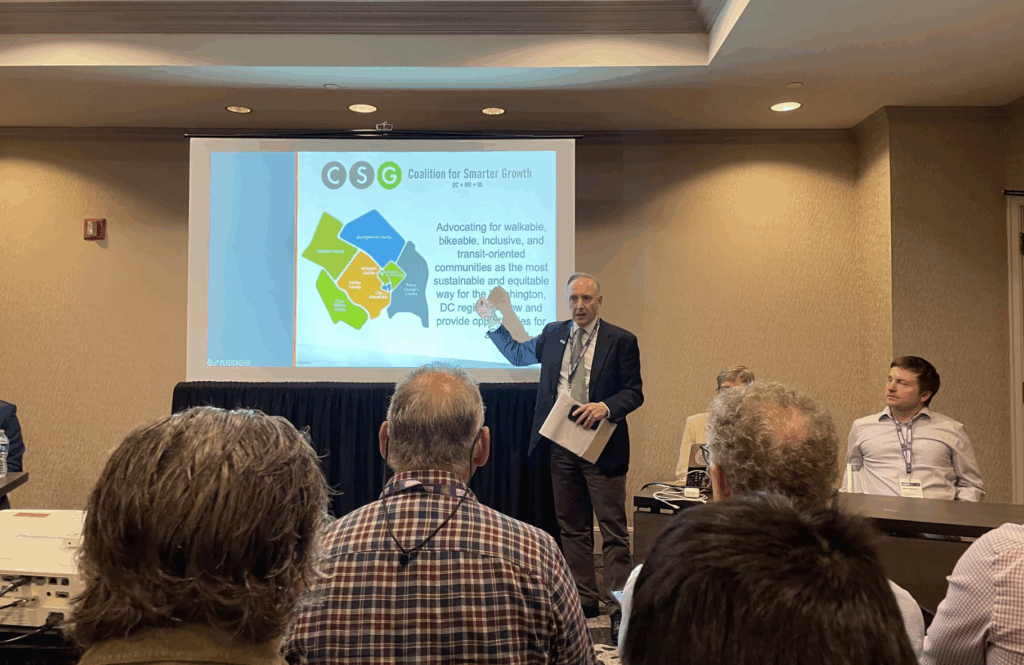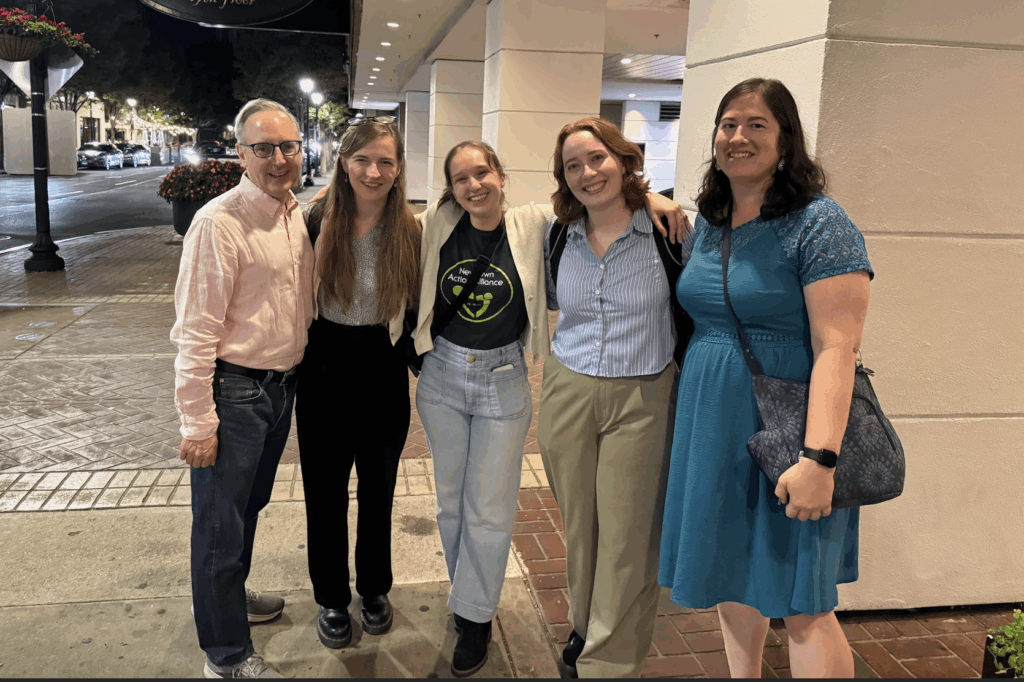Post by Becca Dedert, Virginia Housing Advocacy Specialist
In September, land use champions from across the country (and across the pond!) gathered in New Haven for the annual YIMBYTown conference, hosted by DesegregateCT. CSG’s Executive Director Stewart Schwartz (a Connecticut native), and teammates Carrie Kisicki and Becca Dedert attended to share our lessons-learned from the DC area while learning from others. Out of the almost 100 plenaries, panels, and “unconferences” offered, we honed in on key smart growth insights and learned about interesting examples of these strategies in action from our allies.

Bringing Smart Growth into Focus
We heard many good arguments for smart growth, including during a session led by our Executive Director, Stewart Schwartz! Here were a few of our favorites:
- YIMBY is a climate policy – research from the Terner Center estimates that changing zoning laws to allow more housing options could reduce greenhouse gases by 1.79 million metric tons annually, in California alone.
- Allowing more uses on land increases its value – states can’t see the full return on their investments in transit infrastructure if localities limit what can be built around it.
- We must take advantage of federal and state investments in high capacity transit – the State of Maryland is seeking to expedite development on land it owns at transit stations and to spur local governments to accelerate development on surrounding parcels.
- Transportation and housing go hand in hand – “to have abundant housing, you need transit,” as Eric Goldwyn of NYU put it. We must invest in both to truly unlock housing accessibility.
Effective Outreach
How to best reach our audiences and effectively communicate our message is an evergreen effort for advocates. We attended sessions to deep dive into interesting tools to strengthen these efforts:
- Visualize your point – take people from 2D to 3D when describing how zoning or design changes could affect their neighborhoods, as planners in Massachusetts did with these density story maps.
- Join the digital age – jump in the pool with the TikTokers and become an advocacy influencer with engaging short-form videos. Take a peek at CSG’s foray into this medium with this video on our Blueprint for a Better Region. (Admittedly it is 3.5 minutes – but we also have 30 second versions!)
- Show up! While this is nothing new to our supporters, it’s worth emphasizing the importance of being a familiar face at your local public hearings, events with your representatives, and even neighborhood association meetings. If you would like to get more involved, CSG regularly shares these opportunities in the wider DC region through our website and email alerts.
Promising Policies
As dedicated policy enthusiasts, we enjoyed nerding out at the many policy panels and workshops offered at YIMBYTown and meeting other advocates leading the charge for housing reform. Here are a few key movements in the policy world that we found compelling:
- States zoning into the future
- Montana Miracle – From legalizing accessory dwelling units (ADUs, or “backyard cottages”) to requiring localities to allow multi-family housing in commercial zones, Montana has become a bold leader in state housing policy through the slew of zoning reforms it passed in 2023 and 2025.
- Enabling transit-oriented development – Attendees from California were riding a high from the recent success of SB 79, a transformative bill that legalizes the development of multi-family housing near transit stops.
- Faith in housing – The movement to allow faith-based institutions to develop affordable housing on their property is gaining traction across the country, with Oregon and California being early adopters.
- Making progress through technical reforms
- Legal reform – Reasonable boundaries can be set for who can appeal land use lawsuits by reforming ”standing”, like in Wisconsin, or limiting the time frame in which you can appeal, like in Colorado.
- Building code reform – did you know the code development process is public? Every three years, volunteers gather to submit code proposals, and you can be one of them. You can even invite your legislators to get in on the movement for sustainability codes or single-stairway reform.
- Permitting reform – there are many tweaks to existing permitting regulations that can make it easier and faster to build housing, from implementing third-party reviews to expediting approval processes. States across the country are exploring these no-cost options to drive housing production.
- Exploring innovative ideas
- Street Votes – fellow YIMBYs from the United Kingdom shared an innovative policy that enables residents of a particular street to vote on whether they would like to adopt upzoning as a community, a highly localized yet democratic policy.
- Horizontal Property Regime (HPR) Law – Tennessee recently developed HPRs, which are ultra-simplified homeownership associations (HOA) designed to make the formation of an HOA for duplexes quick, cheap, and simple. This allows for the separate sale of ‘detached duplexes’ on the same lot.
- Direct pay in LIHTC – providing eligible entities the value of tax credits as direct payments could unlock the use of LIHTC (federal Low Income Housing Tax Credits) for many promising models not currently fundable under the program, like housing co-ops.

We enjoyed our annual deep dive in the YIMBY movement and look forward to continuing to bring a smart growth approach to these exciting ideas. Thank you for being a part of the growing movement for vibrant, walkable neighborhoods as we work with our local and state decision-makers to build a better region for all.
Images by Carrie Kisicki
